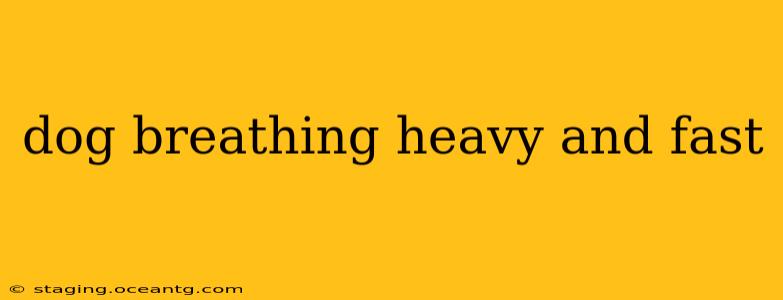Is your dog breathing heavily and fast? This can be a worrying sign, and it's crucial to understand the potential causes and when to seek veterinary attention. While occasional rapid breathing can be normal, persistent or excessive panting warrants immediate investigation. This comprehensive guide will help you identify potential causes, understand when to seek professional help, and learn how to best support your canine companion.
What Causes a Dog to Breathe Heavily and Fast?
Several factors can contribute to rapid and heavy breathing in dogs. These range from relatively benign causes to serious medical emergencies. Understanding the potential causes is the first step in providing appropriate care.
-
Exertion: After vigorous exercise, playing fetch, or a long walk, your dog might breathe heavily and quickly. This is a normal physiological response as their body works to regulate its temperature and oxygen levels. This usually resolves within a short period.
-
Overheating: Dogs pant to regulate their body temperature. Exposure to high temperatures, lack of shade, or strenuous activity in hot weather can lead to overheating and rapid breathing. This can quickly escalate into heatstroke, a life-threatening condition.
-
Stress or Anxiety: Just like humans, dogs can experience anxiety and stress. Loud noises, unfamiliar environments, separation anxiety, or even a visit to the vet can trigger rapid breathing.
-
Pain: If your dog is experiencing pain, whether from injury or illness, they may breathe heavily and quickly. Observe for other symptoms such as limping, lethargy, or unwillingness to move.
-
Underlying Medical Conditions: Rapid breathing can be a symptom of several underlying medical conditions, including:
- Heart disease: Cardiac issues can strain the respiratory system, leading to increased breathing rate.
- Lung problems: Conditions like pneumonia, bronchitis, or collapsing trachea can cause difficulty breathing.
- Infections: Respiratory infections or other systemic infections can also affect breathing.
- Obesity: Overweight dogs may have difficulty breathing due to increased strain on their respiratory system.
My Dog is Breathing Fast: When Should I See a Vet?
While occasional rapid breathing after exercise is normal, you should seek veterinary attention immediately if your dog exhibits any of the following:
- Persistent rapid breathing: If your dog's heavy breathing persists for an extended period, even after resting.
- Difficulty breathing: If your dog seems to be struggling to breathe, exhibiting signs like open-mouth breathing, blue gums, or gasping.
- Other symptoms: If rapid breathing is accompanied by other symptoms such as lethargy, coughing, vomiting, diarrhea, or collapse.
- Blue or pale gums: These can indicate a lack of oxygen and are a serious emergency.
- Increased heart rate: A rapid heart rate often accompanies rapid breathing and can signal a serious issue.
How Can I Help My Dog Breathe Easier?
If your dog's rapid breathing seems related to exertion or heat, try these steps:
- Provide shade and cool water: Move your dog to a cool, shady area and offer fresh, cool water.
- Allow your dog to rest: Let your dog rest quietly until their breathing returns to normal.
- Cool them down gradually: You can gently apply cool (not cold) water to their paws and belly, but avoid completely submerging them in cold water, as this can cause shock.
Never attempt to treat underlying medical conditions at home. If you suspect a medical problem, immediate veterinary care is essential.
Is Rapid Breathing in Dogs a Sign of Heart Failure?
Rapid breathing can be a symptom of heart failure in dogs, but it's not the only indicator. Other signs of canine heart failure include coughing, lethargy, weight loss, and exercise intolerance. If your dog exhibits these symptoms along with rapid breathing, it's crucial to consult a veterinarian for proper diagnosis and treatment. Heart failure requires ongoing veterinary management and medication.
What are the Symptoms of a Collapsing Trachea in Dogs?
A collapsing trachea is a common condition in small breed dogs, particularly those that are overweight. Symptoms include a honking cough, especially after exercise or excitement. Difficulty breathing, especially during exertion, and sometimes rapid, shallow breathing are also common. Veterinary diagnosis and management are crucial.
My Dog is Breathing Fast After Surgery: Is This Normal?
Post-surgical breathing can vary depending on the type of surgery and your dog's overall health. Some level of rapid breathing might be expected immediately after surgery due to anesthesia and pain. However, persistent or excessively rapid breathing should be reported to your veterinarian immediately.
By being observant and understanding the potential causes of rapid and heavy breathing in your dog, you can provide the best possible care and ensure prompt veterinary attention when necessary. Remember, it's always better to err on the side of caution when it comes to your dog's health.
